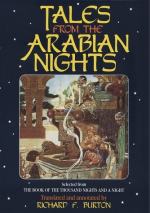[FN#156] The idea is that of the French anonyma’s “Mais, Monsieur, vous me suivez comme un lavement.”
[FN#157] The text (p. 243) speaks of two eunuchs, but only one has been noticed.
[FN#158] Arab. “Manjanik;” there are two forms of this word from the Gr. {Greek}, or {Greek}, and it survives in our mangonel, a battering engine. The idea in the text is borrowed from the life of Abraham whom Nimrod cast by means of a catapult (which is a bow worked by machinery) into a fire too hot for man to approach.
[FN#159] Showing that he was older; otherwise she would have addressed him, “O my cousin.” A man is “young,” in Arab speech, till forty and some say fifty.
[FN#160] The little precatory formula would keep off the Evil Eye.
[FN#161] Supper comes first because the day begins at sundown.
[FN#162] Calotte or skull-cap; vol. i. 224; viii. 120.
[FN#163] This is a new “fact” in physics and certainly to be counted amongst “things not generally known.” But Easterns have a host of “dodges” to detect physiological differences such as between man and maid, virgin and matron, imperfect castratos and perfect eunuchs and so forth. Very Eastern, mutatis mutandis, is the tale of the thief-catcher, who discovered a fellow in feminine attire by throwing an object for him to catch in his lap and by his closing his legs instead of opening them wide as the petticoated ones would do.
[FN#164] She did not wish to part with her maidenhead at so cheap a price.
[FN#165] Arab. “Subu’” (for “Yaum al-Subu’”) a festival prepared on the seventh day after a birth or a marriage or return from pilgrimage. See Lane (M. E. passim) under “Subooa.”
[FN#166] For this Anglo-Indian term,=a running courier, see vol. vii. 340. It is the gist of the venerable Joe Miller in which the father asks a friend to name his seven-months child. “Call him ‘Cossid’ for verily he hath accomplished a march of nine months in seven months.”
[FN#167] Arab. “Madafi al-Salamah,” a custom showing the date of the tale to be more modern than any in the ten vols. of The Nights proper.
[FN#168] Master, captain, skipper (not owner): see vols. i. 127; vi. 112.
[FN#169] Zahr al-Bahr=the surface which affords a passage to man.
[FN#170] Arab. “Batiyah,” gen.=a black jack, a leathern flagon.
[FN#171] “Kunafah"=a vermicelli cake often eaten at breakfast: see vol. x. 1: “Kunafani” is the baker or confectioner. Scott (p. 101) converts the latter into a “maker of cotton wallets for travelling.”
[FN#172] In the text (iii. 260) “Midi,” a clerical error for “Mayyidi,” an abbreviation of “Muayyadi,” the Faddah, Nuss or half-dirham coined under Sultan al-Muayyad, A.H. ixth cent.=A.D. xvth.
[FN#173] Arab. “Rub’” (plur. “Arba’")=the fourth of a “Waybah,” the latter being the sixth of an Ardabb (Irdabb)=5 bushels. See vol. i. 263.




